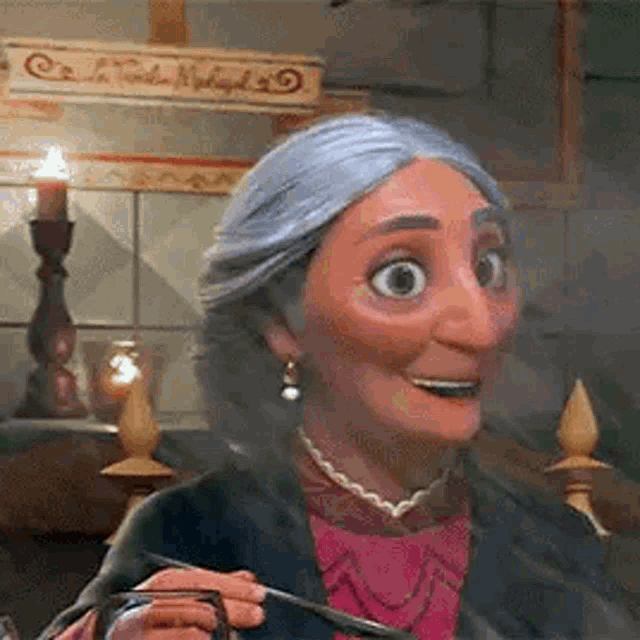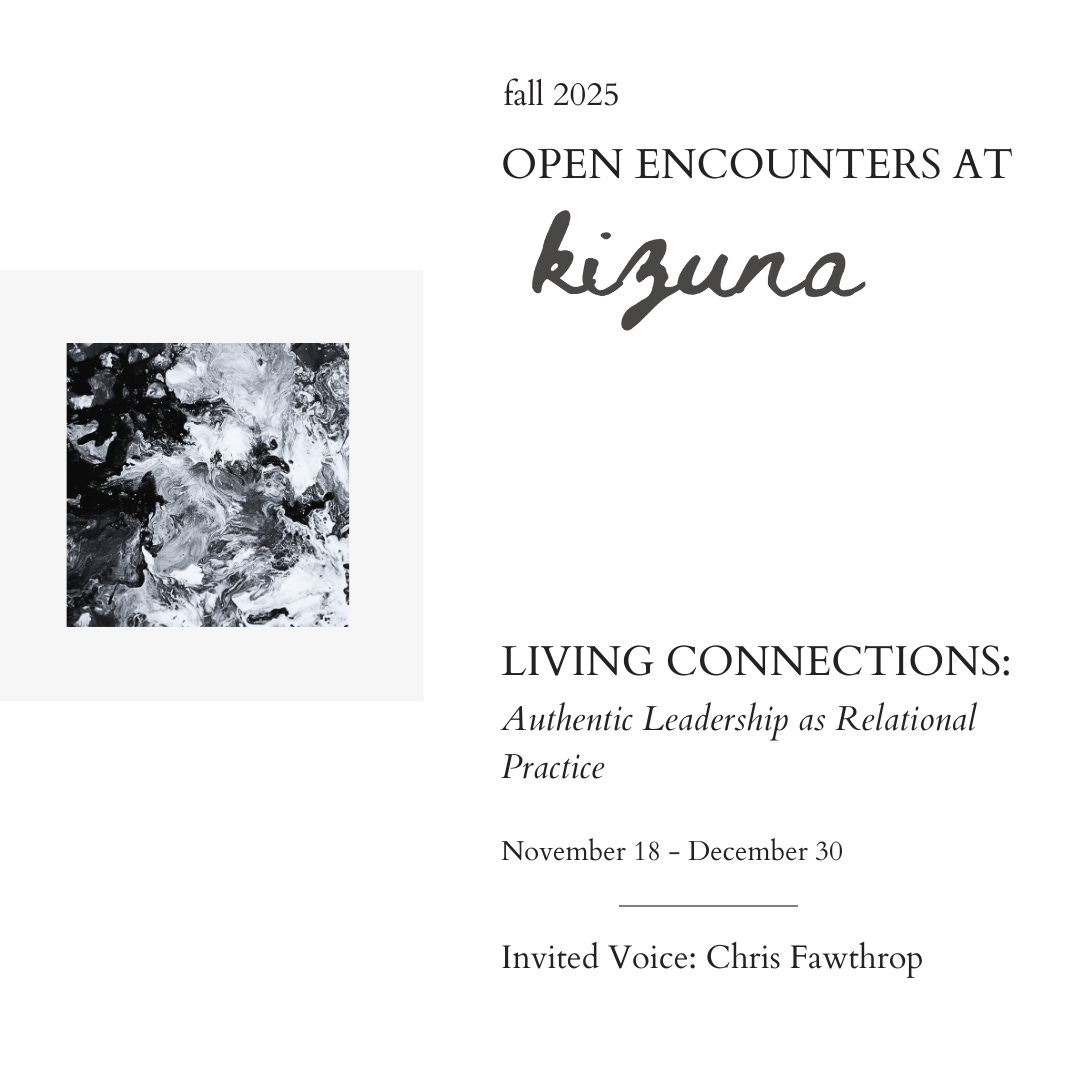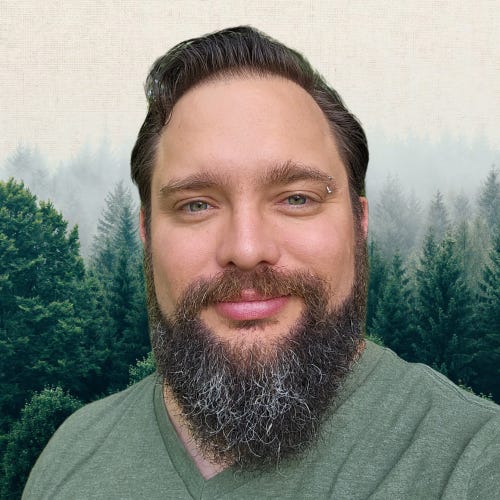Hello Everyone,
I’m busy prepping for next Tuesday’s Open Encounter (details below in case you missed the newsletter on Monday), so just some quick thoughts today.
Note: My toddler has an appointment, so this Friday’s (11.14.2025) Coffee Chat livestream will be moved from it’s usual time to 12 PM EST. People drink coffee at lunchtime, right?
Authenticity is a topic that was going around a lot more earlier this year, and it’s still being discussed, but not as explicitly, or “trendily.” 𝗕𝘂𝘁 𝗜 𝘁𝗵𝗶𝗻𝗸 𝘁𝗵𝗲𝗿𝗲 𝗶𝘀 𝗮 𝗿𝗲𝗮𝘀𝗼𝗻 𝗳𝗼𝗿 𝗶𝘁.
Many envision authenticity, or the practice of being authentic as individuals and leaders, as being empowering, or something that feels good.
Or perhaps the opposite - that it feels too scary to be your authentic self, you might get hurt.
Either way, the interpretation is focused on the self, especially now, when multiple crises of leadership, social cohesion, and economic uncertainty are taking place.
Some are desperate for meaning, authenticity, and connection, yet putting on masks of survival once again. It’s hard not to do so myself.
The reality of whether you will be inspired or hurt lies somewhere in the middle, as does authenticity itself. It can be empowering and terrifying at the same point in time.
𝗔𝘂𝘁𝗵𝗲𝗻𝘁𝗶𝗰𝗶𝘁𝘆 𝗰𝗮𝗻 𝗼𝗻𝗹𝘆 𝗯𝗲 𝗳𝗲𝗹𝘁.
🔸You recognize it in a hand-carved door frame.
🔸You see it in the quiet smile of someone receiving a gift.
🔸You hear it murmur through a concert crowd when 𝙩𝙝𝙖𝙩 song is played
🔸You sense it when someone has your back despite all the odds.
Authenticity is not strictly an internal aspect of ourselves.
Not something to be developed, harnessed, and displayed.
What we think of as authenticity more often than not, is taste, preference, or discernment.
Authenticity is an intangible entity that lives in the liminal space between things.
Authenticity is co-created.
Authenticity is relational.
Something to be cultivated, explored, and responded to.
𝗜𝘁 𝗶𝘀 𝗵𝗼𝘄 𝘆𝗼𝘂 𝘀𝗵𝗼𝘄 𝘂𝗽 𝗳𝗼𝗿 𝗽𝗲𝗼𝗽𝗹𝗲.
This theme is fairly evident if you’ve seen the movie Encanto1 (highly recommend), where it is explored through the Madrigal family’s attempts to maintain a perfect facade rather than embracing their true, unique selves: flaws and all.
The main character, Mirabel, doesn’t appear to have the same gifted qualities her family does, and this serves as a more-than-teenage-angst challenge, which ultimately prompts the family to confront generational trauma and the pressure to be more than they are.
Mirabel’s uncle, Bruno, goes into hiding to protect her because he is more afraid of her getting blamed and hurt than his own welfare (or facing his family?), but his lack of presence in her childhood leaves a void and sense of isolation that could have been bridged if he had stayed and been a supportive role model.
Ultimately, the events of the movie lead the family to realize that their true self-worth and strength as a community lie in being their authentic selves and connecting vulnerably with one another, lessons that go beyond family dynamics and touch on the inter-generational leadership trauma that has led to the ongoing crisis of leadership.
If you are interested in grappling with this relational understanding of authenticity more, I invite you join me and other emerging thinkers, creative practitioners, and those seeking new forms of leadership, on 𝗧𝘂𝗲𝘀𝗱𝗮𝘆, 𝗡𝗼𝘃. 𝟭𝟴𝘁𝗵, 𝟭𝟮 𝗣𝗠 𝗘𝗦𝗧 / 𝟵𝗔𝗠 𝗣𝗦𝗧 at Kizuna’s fall 2025 Open Encounters pathway, to collectively explore the question:
“How does our understanding of authentic leadership change when we reframe it from a cultivated inner trait to a relational conversation between entities?”
I encourage everyone to apply for Community Tier pricing before the deadline passes.
𝗥𝗲𝗾𝘂𝗲𝘀𝘁 𝗘𝗻𝘁𝗿𝘆 here
𝘊𝘰𝘮𝘮𝘶𝘯𝘪𝘵𝘺 𝘛𝘪𝘦𝘳 𝘗𝘳𝘪𝘤𝘪𝘯𝘨:
🔸Application Only
🔸Will close Saturday, 11.15.2025, 11:59PM PST (11.16.2025 2:59 EST).
𝘈𝘭𝘭 𝘖𝘵𝘩𝘦𝘳 𝘛𝘪𝘦𝘳𝘴:
🔸Open until Sunday, 11.16.2025, 5PM EST/2PM PST
I hope to see you there!
Until next time,
- Chris
Welcome, and thank you for your presence!
I am a leadership ecologist rooted in Appalachia, raised through environmental respect, military service and Western educational institutions. I use an animistic lens to better understand the relationship between individuals, organizations, and systems.
When working with leaders and organizations, my approach not one of doctrine, but of guidance and tending to: to memory, to culture, to systems and people. I believe leadership is not a fixed role, but a living, relational practice.
My work draws from my lived experience and research into myth-making, insurgency and business strategies, regenerative philosophies, creative works, the landscape I inhabit, and the mundane, because the ember of humanity is often nurtured in and between those spaces.
If something resonates, leave a comment, or reach out to chat - I always love hearing people’s stories.
You are always welcome to book a free call to either get fresh perspective or see if we’d work well together in cultivating your capacity to lead.
I offer a variety of services, 1:1 coaching, group programs, leadership training development, and culture consultation.
thumbnail photo taken from https://d23.com/why-everyone-is-talking-about-bruno-from-encanto/






Exactly bruh... Authenticity is everything and also one of the key aspect of a business start-up and this is what makes you unique from different business.